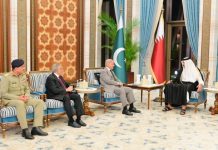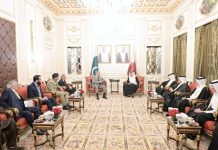ISLAMABAD: Lawmakers disqualified under Article 62(1)(f) of the Constitution will know today the duration of their disqualification as the Supreme Court will announce its verdict on the case today.
The verdict is expected to be announced shortly.
On February 14, a five-member larger bench, headed by Chief Justice of Pakistan Justice Saqib Nisar, had reserved the verdict while hearing several petitions seeking to determine the time-period a lawmaker would remain disqualified for after being de-seated in violation of Article 62(1)(f) and other election laws.
During the hearing, the court had observed that the disqualification will continue for as long as the declaration [signed by electoral candidates declaring them honest] holds, adding that the 18th Amendment, passed in 2010, did not determine a time period for disqualification.
At an earlier hearing on February 8, the chief justice had also acknowledged the ambiguity of Article 62(1)(f) of the Constitution.
‘Sadiq and Ameen’
Article 62(1)(f) reads: “A person shall not be qualified to be elected or chosen as a member of Majlis-e-Shoora (Parliament) unless-…he is sagacious, righteous and non-profligate, honest and ameen, there being no declaration to the contrary by a court of law.”
The judgment would have consequences for disqualified lawmakers, especially Pakistan Tehreek-e-Insaf leader Jahangir Tareen and former prime minister Nawaz Sharif.
On December 15, last year, the Supreme Court had disqualified Tareen for failing to declare an offshore company and a foreign property in his election nomination papers.
Similarly, the then prime minister Nawaz was disqualified by the Supreme Court on July 28, 2017, for concealing in his nomination papers the receivable income from his son’s company in UAE.
‘Disqualification should last till next election’
On February 6, Nawaz had informed the court that he would not be partaking in the proceedings after the bench had issued him notices.
The former premier had maintained that in his understanding “to take part in election process is a fundamental right and therefore no perpetual disqualification can be imposed on someone by interpreting Article 62 of the Constitution of Islamic Republic of Pakistan.”
He had further said that “a time limit could have been provided by the Parliament but since it has not been done so, the issue of qualification under Article 62 is confined only to the election in question.”
“I being a strong proponent of democracy believe that it is the right of people of Pakistan to participate in the process of election and to reject or elect candidate(s) of their choice. They enjoy an inalienable right to elect their representatives through a true democratic process and not be given the list of selective people through the process of elimination.”




